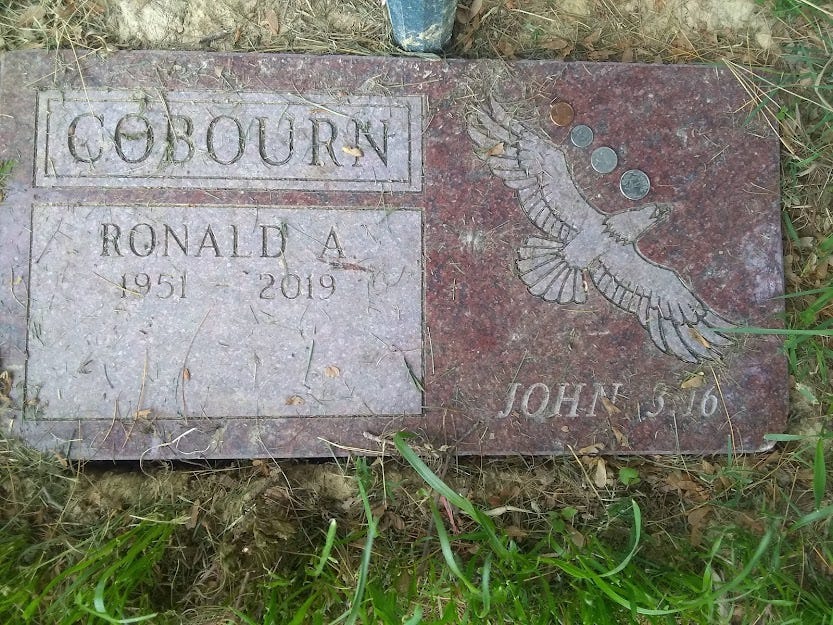RULES FOR GRIEVING
Finding Father: A Journey of Grief on the Autism Specvtrum
BLANKET
"Can I have Dad's blanket?" my son asks.
It is a hot day in July and I cannot imagine why Allen wants a blanket brought from a hospital visit but it has been a draining week and I haven't the energy to form a question and listen to a response.
"Okay," I say. "I washed it this morning. It's in the dryer now." Allen heads to the basement and I think of the soiled laundry I dragged downstairs a few hours ago; shorts and T-shirts, bed pads and sheets. Things to fold and place into neat piles and think of giving away.

Allen is back in a few minutes, the white blanket in one hand, a purple sheet in the other. "Can I have the sheet, too?" he asks and I nod. "They're just what I need," he says happily and carries them up to his room, the place that holds an assortment of eclectic items important to Allen.
I hear him in his room, moving things around, murmuring to himself. While I am proud of all three of my children and the love they displayed this week, I am particularly proud of my youngest son, whose Asperger's Syndrome makes sensory input and social interactions painful. Yet from Saturday night when EMTs flooded the house and the blue lights of emergency vehicles revolved outside to the burial at the cemetery five days later, he has--with the utmost of strength--kept himself together and with us. His siblings and I have allowed him to process things in his own way.
His grief is different from his older siblings.
AUTISM AND GRIEF
Bonnie and Dennis stood on the back deck the night Ron died, arms around each other, openly sobbing as paramedics tried and failed to save Ron. Allen sat in a kitchen chair, an ice cube in each hand, letting the sensation of cold block out the cacophony of sensory overload. He seemed calm and detached, but inside his neuro-atypical brain was trying to make sense of the insensible. Order and preparation are necessary tools on the autism spectrum, but death always catches us off-guard.
We'd had conversations about it. All three children had seen their father struggle through many surgeries and hospitalizations, seen his body grow weaker, and seen the pain he suffered on a daily basis. We talked about the "someday", never giving a name to it, hoping that by not naming it we could prolong its coming.
It didn't work.

On Saturday, July 13, at 9:45 according to the policeman who stood vigil, Ron passed peacefully away, the soda and pretzel Allen had gone up to WaWa to get him two hours before on the tray table next to him.
Lynne Soraya, writing for Psychology Today (2014), says for those on the ASD spectrum, there are just no blueprints for some situations that have the potential for sensory overload. The death of a beloved parent--particularly when it occurs at home, where safety and security are assumed, can easily throw an aspie into a meltdown. Karla Fisher (2012) explains the "meltdown model" in her own reaction to her father's sudden death. A meltdown may not be an outburst--screaming, kicking, acting out--but an inward processing failure. The four emotions readily recognized by most autistics--happy, sad, anger, and fear--collide and entangle in ways foreign and strange to neuro-typicals.
Those on the spectrum, like the rest of us, need to process grief in our own way. The older kids have their homes, their partners, and their careers. Allen’s life is still here, with me. He asks me a hundred times a day if I am okay. I am his touchstone. If I am okay, he can be okay. When someone asks how he is doing, he says, "Mom knows." Right now, it is all that matters to him.
BELIEVE
Well, that and a few of his father's possessions he carefully guards: a blanket, a sheet, a card game, a golf club, the chess board he and his dad used to make up a zany game with GI Joes.
Allen knows his father is gone. He knows we buried Ron's broken body at Lawncroft Cemetery last Thursday. But in some part of his being, beyond the senses and the need for ice cubes in his hands, he knows that death is not really the end. He told his therapist just yesterday when she asked him how he felt, "I know what everyone says. I know they all say my dad is dead. I just want Dad to know that if he wants to, he can come back. 'Cause we love him."
It is evening now and we have picked at a supper. Allen has joined me in the living room where I am knitting and pretending to watch a movie. He has his dad's blanket and the chess board. He sits at Ron's tray table, playing by himself the complicated game he and Ron made up. He turns to me and asks,"Do you think Dad is playing with your dog that died?"
"Yes," I say.
He nods and smiles. "All I'm asking," he says seriously, "is for you to believe in the possibility that we'll see Dad again. That he’s not really gone forever and ever. I just need you to believe that.”
“Okay,” I say. “I’ll believe it.”
I had no idea what I was promising.



